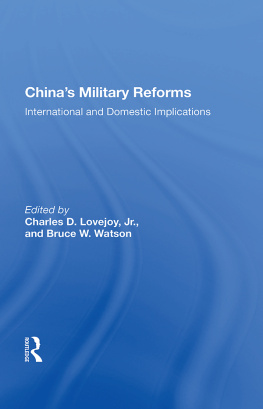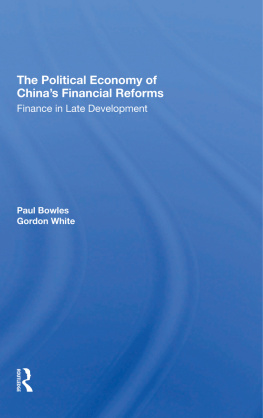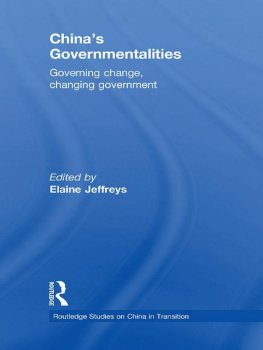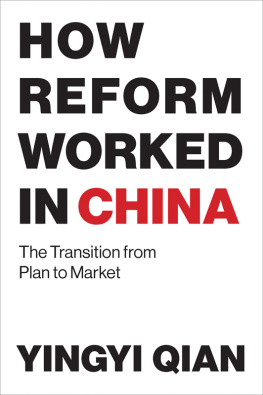
Chinas Enterprise Reform
Chinas basic work units, collectively known as the danwei system, have undergone significant reform, particularly since 1984. The heart of the danwei system are multi-functional units that constitute the bottom layer of the party/state machinery. They are engaged in planning, party ideology and providing social welfare for workers. The danwei system is now being progressively dismantled.
You Ji examines how the danwei system operates and how reform is generating change in the party at grassroots level. The book is particularly concerned with three major institutional reforms in Chinas state sector:
- political reform of the party leadership, the cadre appointments system, management mechanisms and the state/enterprise administrative chains;
- market reform with an emphasis on ownership;
- changes in the industrial social welfare system.
The author demonstrates how Chinas post-Mao reforms have produced a quiet revolution from below as the process of political and economic liberalization has accelerated. This book presents new research findings that will be invaluable to those wishing to understand the nature of change in China.
You Ji is a lecturer in the School of Political Science of the University of New South Wales, Sydney, Australia. He has published widely on Chinas political, economic and military affairs.
Routledge Studies in China in Transition
Series Editor: David S. G. Goodman
1 The Democratisation of China
He Baogang
2 Beyond Beijing
Liberalization and the Regions in China
Dali L. Yang
3 Chinas Enterprise Reform
Changing State/Society Relations after Mao
You Ji
First published 1998
by Routledge
2 Park Square, Milton Park, Abingdon, Oxon, 0X14 4RN
Transferred to Digital Printing 2005
Simultaneously published in the USA and Canada
by Routledge
270 Madison Ave, New York NY 10016
1998 You Ji
Phototypeset in Times by Intype London Ltd
Antony Rowe Ltd., Chippenham, Wiltshire
All rights reserved. No part of this book may be reprinted or reproduced or utilised in any form or by any electronic, mechanical, or other means, now known or hereafter invented, including photocopying and recording, or in any information storage or retrieval system, without permission in writing from the publishers.
British Library Cataloguing in Publication Data
A catalogue record for this book is available from the British Library
Library of Congress Cataloging in Publication Data
A catalogue record for this book has been requested
ISBN 0-415-15726-9
To my mother Chen Shishu
Contents
Depoliticisation: diminishing party controls
Figures and tables
Figures
Tables
Preface
In the late 1970s, as Chinas reform era opened, the Communist Party of China committed itself to first doubling and then redoubling the aggregate size of the economy of the Peoples Republic of China by the end of the millennium. At the time and into the early and mid-1980s it was a prospect greeted as a desirable aspiration by most academic observers of China, but as little more. Many economists in particular pointed out the difficulties in the project and the near-impossibility of its achievement. In the event the target was attained with almost five years to spare, sometime in 1995.
The rapid growth of Chinas economy is a useful starting point for this series, intellectually as well as chronologically. It is not only that China has developed so spectacularly so quickly, nor that in the process its experience has proved some economists to be too cautious. Rather, its importance is to demonstrate the need for explanatory theories of social and economic change to themselves adapt and change as they encompass the processes underway in China, and not to assume that previous assumptions about either China or social change in general are immutable.
China in Transition aims to participate in these intellectual developments through its focus on social, political, economic and culture change in the China of the 1990s and beyond. Its aim is to draw upon new, often cross-disciplinary research from scholars in East Asia, Australasia, North America and Europe, as well as that based in the more traditional disciplines. In the process, the series will not only interpret the consequences of reform in China, but also monitor and reflect the changes of the future.
Chinas state sector enterprises have always threatened to be a dead-weight on the transformation of the economy in reform. They represented not simply a massive productive force at the centre of the former command economy but, even more significantly, the heart of the political economy of state socialism in the Peoples Republic of China. A first and crucial stage in the process of reform was to adapt, if not to completely sever, the nexus between politics and economics to allow the diversion of investment funds into light industry and away from heavy industry, the sector where state-owned enterprises dominated. A second stage, which appears to be a major item on Chinas agenda for at least the latter half of the 1990s, is the reform of state sector enterprises in themselves.
In Chinas Enterprise Reform, You Ji examines this process and its consequences through a focus on the danwei the basic work unit that characterised the former party-state and was an essential part of corporatist state socialism. In particular, he concentrates on the extent and nature of institutional reforms in the development of state sector enterprises since 1984. In contrast to other accounts of those processes he highlights the ways in which enterprise reform has started to transform the party-state as well as the state sector of the economy, not through the purposive action of leadership but through the dismantling of the earlier systems of control in the basic work units from the bottom up. Basic work units within the state sector have already changed beyond the boundaries of their previous existence. In that process of structural change they have not only laid the foundations for their continued development but, as importantly, contributed to political institutionalisation.
David S. G. Goodman
Institute for International Studies, UTS
August 1997
Acknowledgements
This book is based on my Ph.D. dissertation, completed in 1993 at the Australian National University. Therefore I should thank first of all the ANU where I spent five and a half most productive years as an MA and Ph.D. student. During this time I was very fortunate to receive enormous help and encouragement from a large number of people who shared their knowledge with me about Chinas political and economic development. When I took a teaching position in the Department of Political Science, the University of Canterbury, New Zealand, in 1994, I continued to receive their assistance. Without their help and friendship, it would have been impossible for me to go through this painstaking process of writing and rewriting.
As time passes, the number of people who have extended their assistance to me grows. I would like to begin with sincere thanks to Dr Jonathan Unger, to whom I owe the greatest debt. Dr Unger acted as my sole supervisor, and was a constant source of new knowledge and inspiration. I am grateful not only for his steady and patient supervision at all stages of this research but also for his moral support and confidence in my work. At several points his guidance played a crucial role in keeping the project on the right track. Without it I would have been unable to complete this book.








